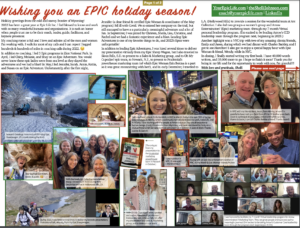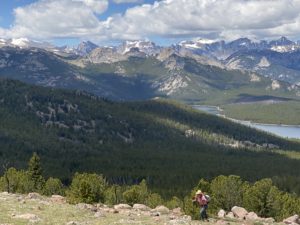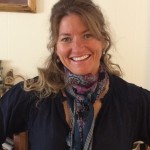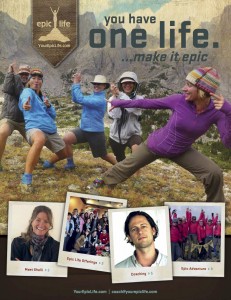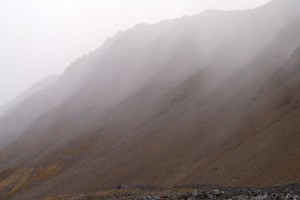October 6th, 2020
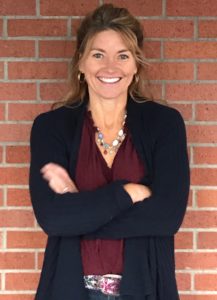
Hi there!
Sometimes my life probably appears to be perfect. Especially on Facebook. It’s not perfect, but at least right now, my life is pretty amazing. (For what it’s worth, everything I post on Facebook is true; I don’t work to make my life look better than it is.)
That said, I’m human, and like everyone, I suffer depressive moments and hardships. (If I had been active on Facebook 10-12 years ago, my posts would look very different from my posts these days. Actually, unless I’m asked, I don’t like to talk about my problems, so probably I would have been “hiding,” and not very visible on Facebook back then.)
Josh Waitzkin, a former chess champion, and author of the awesome book, The Art of Learning, once said in an interview, “There is no such thing as good weather or bad weather, only weather.” The same could be said for life. It’s full of depressions and celebrations. Nobody’s life is perfect, not even my current one, which, as I said, feels amazing.
When I share with coaching clients, or friends, or groups I present to about my vulnerabilities, failures and about why my current blessed life is “hard earned,” people often respond with surprise – and relief. They wouldn’t have guessed my life was me-sy because unless you’re one of the aforementioned, you often don’t see that part of the “profile.” So this blog post will share about something near and dear to me – the importance of daring to fail, and in sometimes failing, including some of my messier parts. (There is a lot more where this came from, and I’m happy to share more personally if you’d email me and request it.)
One of my darkest times was during a time when I had so much to celebrate… We had sold our company of 15 years to a company I respected, and suddenly I had time, additional security, and very importantly, the opportunity to reinvent myself.
There’s a quote from Dov Seidman, CEO of LRN, in Thomas Friedman’s fantastic and important book, Thanks for Being Late: An Optimist’s Guide to Thriving in the Age of Accelerations: “When you press the pause button on a machine, it stops. But when you press the pause button on human beings they start.”
When I suddenly had time, and my pause button was pushed, I found I had a lot of hard personal truths to confront. Such as: I was overweight, sedentary, addicted to technology, drinking wine on too many weeknights, and depressed. For two years, every night after Jerry and the boys were asleep I’d beat myself up (in the form of self loathing) about the fact I let another day go by without taking a step to improve my health, and to get re-engaged in my family and my life. To get conscious again. This self loathing stemmed from a feeling of deep regret – for not taking action at something that could be life-altering, and that, in fact, was in my control.
I share this because I don’t know about you, but for me, nothing motivates me more than my not wanting to have any regrets. I’ve been there, and it was paralyzing, and an awful place to be.
I have recovered from the earlier bout of regret and self loathing, but life will always have some mess and heartbreak and hardship in it. I know this. It is for certain.
While I’m healthy and hopefully only midway through my life, for all I know, I may not wake up tomorrow. So I’m not going to take any chances. I think one of the hardest things any of can do is dare to live the life we are yearning to live – our life, not the life others expect us to live. Not a life where we play it safe. In fact, ironically I think we can risk our life by not living it. (One of the greatest regrets of the dying is that they didn’t have the courage to live their life, rather than a life others expected them to live, or a life that was safer and easier.)
Speaking of regret, when you talk to people who are approaching the end of their life, and you ask them, “What, if anything, do you regret?” most of the time, they list the things they didn’t do that they wish they could do that they can no longer do. In other words, they regret their inactions more than their actions.
What is something you’re wanting to do, but you’re not doing because you’re afraid? Take a minute and think about that. I know there is at least something that will come to mind if you’re honest with yourself.
Despite a range of life and work experiences, and expertise, I don’t consider myself an expert on anything. But I love to learn, and, I am pretty good at it. And thanks to the more than 200 individuals I’ve coached in the last six years, including the 100+ people I’ve led on wilderness adventures, I’ve learned a lot.
Here is one of the most important things I’ve learned: The number one reason we don’t do the things we want, need, or could do is because we are afraid. When I ask people, What are you afraid of? Almost always I hear, “That I will fail.” And when I drill down even further and ask, What do you mean by fail?, One or more of these are what I almost always here in response:
-I’m afraid I will fail. The thing will not be success, and I may not be able to recover.
-I’m afraid I will disappoint others.
-I’m afraid I will disappoint myself.
-I’m afraid I’ll look bad or that I’ll make a fool out of myself. I’m afraid I won’t know what I am doing, and that I won’t have what it takes.
By the way, I use all of the above excuses, too. I have things to share on each of these, including some things I’ve never shared publicly before, so I hope you’ll read on. Thanks in advance if you do.
I’m afraid I will fail. The thing will not be success, and I may not be able to recover.
Well, first off, we learn more from our failures than successes. There’s the saying, “Win or Lose” and “You win some and you lose some.” I can’t recall who said this, but someone suggested we change those sayings to “Win or Learn,” and “You win some and you learn some.” I love the suggested modifications.
I have written about it before, but as an adult, my first significant failure was losing my Division I basketball scholarship at University of Montana. I just wasn’t good enough, and the coach told me this much, and my scholarship went to a more capable player. I’m 52 now, and while I know a basketball scholarship is not a big deal, at the time, when I was just 21, it was a big deal. It was devastating. Feeling like a failure, and far from home, I suddenly found myself without a map. You can read the blog post about that, but, in short, as a result of that failure, I started hiking, I started spending time in solitude, first out of necessity but later out of desire, and I fell in love with reading. It was 28 years ago that I lost my scholarship, and for the past several years, hiking, solitude and reading have been tremendous sources of inspiration for me, and are critical components of my work and mission here at Epic Life Inc. I don’t think these three things would have become important, or that my life would be as amazing as it is today, had I continued riding the bench and having basketball play such a big part of my life. So, like so many people would say of their failures when looking back at them, my first significant failure turned out to be one of my biggest blessings.
I have also failed financially. My husband, Jerry, and I, got into deep personal financial struggles early in our marriage. In 1995, year three of our marriage, we had racked up almost $40,000 in personal credit card debt. In the beginning we joked that the debt was worthwhile because the the start of our debt had accumulated as a result of our using credit cards to pay for long distance phone bills and plane tickets during our two year, long-distance courtship from 1990-1992. But by 1995, it was no joke. We weren’t laughing, but crying. We sold our first home, and downsized to a very tiny and humble (a little better than a shack) of a house. It took a lot of humility to do that, but we were determined to turn things around for ourselves. It took four years, but we were able to fix up the small house, and pay off our debt with the equity from its sale. Today, we have financial skills we would not have developed if not for that financial failure early on in our marriage and partnership. It was during those financial struggles that Jerry and I committed to eating out only one time a month. Now, more than 20 years later, and the parents of three sons, ages 13, 18, and 20, except for when we’re traveling, we still hold fast to that rule, along with other restraints and financial habits we developed only as a result of overcoming our financial failures. Oh, and today, I am happy to report that we are free of debt.
We also had many failures along our way to success with our first business, Yellowstone Journal Corporation and YellowstonePark.com. We started that company in 1995. The first year we generated a whopping $18,000 in revenue. Over the course of 15 years, we failed a lot, and ate a lot of bread and water for meals, but we always recovered stronger and wiser, and eventually sold the company in 2008 to Active Interest Media.
Now I’m in my 6th year of our second venture, Epic Life Inc, and while being an entrepreneur and running and growing my own business is challenging, I’m so much wiser as a result of all of the struggles during the first go-round, and I’m more resilient when I do run into struggles or failures.
I’m often hired as a keynote presenter and/or speaker. (I prefer to call myself an inspired speaker rather than a motivational speaker) Often people will come up to me after my presentation, and ask how they can do the same work as I do, to which I respond by saying, “I’m a 30-year overnight success.” None of what I have has come easy, and I would argue that most of what’s great in my work and my life has come largely as a result of daring to fail, failing often, and learning more, and developing into a better person and leader as a result of both the daring to to fail, and the failures.
And if we’re committed to fulfilling our potential and to a self actualizing life, we must acknowledge that we will never have arrived. Life is one big journey that is full of both depths and heights.
Along those lines, I am happy(?) to report I’m currently as fallible as ever. In fact, just last year, while leading my flagship program, the Epic Women Wind River backpacking adventure, I made a leadership error. Even after years of leading expeditions and having expertise and knowing better, I made an unexpected mistake. The learning is never over, and I have learned to be humble enough to know this, and to learn as much as I can when I do fail.
I gave up Facebook for 30 days, and “failed” on at least four days when I found myself – you guessed it – on Facebook. I caught myself almost immediately, but only after a little perusing…
I fail as a parent, and as a wife, on a regular basis. I have failed in friendships, and other relationships. I I am likely failing at a couple of things right now, today…
Finally, one final item to share under the “I’m afraid I will fail” excuse. I led a Mt. Whitney co-ed expedition for 10 men and women a few years back. I partnered with a guiding company in the Sierras. Well, as a long-time adventurer, and adventure guide, if I’ve learned anything, it’s that seldom does an adventure go exactly as planned. But my co-ed Epic Whitney expedition had all kinds of challenges. The weather was a huge factor. By the time our 4-day expedition came to an end, we had gone from Plan A, to Plan B, to Plan C and finally to Plan D, which didn’t look anything like our Plan A.
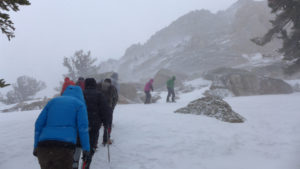
Mt. Whitney. The summit was a No Go.
The year before, during the exact same dates, I went on the same expedition with Backpacker Magazine as part of a Summit for Someone fundraiser for Big City Mountaineers. Everything went better than planned. It went so well that we spent almost 2 hours lounging like marmots under a blue sky on Whitney’s summit. The expedition was inspiring, and it was also a blast. But can you guess which Mt. Whitney expedition developed me more as a leader and as a person? Hands down the second one that went through 4 iterations, and involved 60mph wind gusts, winter blizzards and below zero wind chill – oh, and not standing on top of a mountain. To be sure, we wouldn’t choose these failures, but I personally wouldn’t trade them for anything.
As my partner in the Mt. Whitney expedition so eloquently stated, “The journey is for the soul, the summit is for the ego.” Cheers to the journey, which will almost certainly include some failing.
And trust me, the best, most impactful people and business leaders fail often. They’re not special. They aren’t immune to failure, and in fact, they have the same fears we do.
But don’t just take my word for it – take Adam Grant’s. Grant is the author of two of my favorite leadership books, Give and Take, and Originals. He is also the top-rated professor at Wharton Business School. (Check out these Ted talks, Are You a Giver or a Taker? and The Surprising Habits of Original Thinkers.) While researching and writing Originals, Grant sat down with some of the most original entrepreneurs of our time, including Larry Page, Elon Musk, Jack Dorsey and Mark Cuban. Grant writes, “When I asked them to take me back to the early days, they caught me off guard. They all felt the same fear of failure that the rest of us do. They just responded to it differently.
“When most of us fear failure, we walk away from our boldest ideas. Instead of being original, we play it safe… But great entrepreneurs have a different response to the fear of failure. Yes, they’re afraid of failing, but they’re even more afraid of failing to try.”
Grant was talking about business when he wrote the above, but it applies to our personal endeavors too. All entrepreneurs are human beings, after all.
By the way, I’m even more inspired by a person’s willingness to be brave and vulnerable than I am by his or her greatness. Daring to fail takes daring, and that daring is inspiring to witness. When we dare to fail, we inspire others to dare to fail.
I remember an expedition where we climbed four mountains. One man had never climbed a mountain before, and I hiked right in front or behind him on the first mountain we climbed. The climb took several hours. Every single step the man took was full of fear. His fear was palpable. He was stepping out of his comfort zone and into his potential thousands and thousands of times during what was a 10-hour effort.
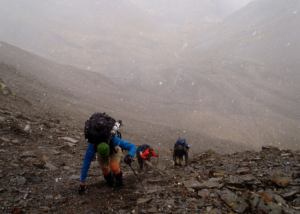
Climbing mountains in high winds, on loose terrain and in a blizzard.
The late Abraham Maslow, an American psychologist who developed ideas related to the “hierarchy of needs,” said, “In any given moment we have two options: to step forward into growth or to step back into safety.”
When we dare to fail, we’re stepping forward into growth. We’re not playing it safe. We’re showing up even though we’re scared, and we’re not playing small. We’re afraid, and we’re proceeding anyway.
One final and important bit about failure. Let’s not be reckless. I’m not recommending being reckless in our daring to fail. No, we must dare to fail with tremendous care. When I work with leaders who are about to launch a new program or product, or who are considering making a major change, we often do an exercise called a pre-mortem. This is basically the act of articulating and writing down your worst fears, the worst case scenarios. I do this same work with my life coaching clients. Often, just by acknowledging and listing our fears, we realize they aren’t as great as we were previously making them out to be. But just as important as acknowledging worst case scenarios, is our need to have ideas for what we do should any of our our worst fears come true.
I recently watched Alex Honnold present here in my hometown of Lander, WY, about his solo climb of El Capitan with no rope. His is an astonishing feat, and it was incredible to see him in person and to meet him. Honnold was saying that in preparation for the challenge (where the stakes are literally his life), he invested significant time climbing the route, and memorizing the moves for the entire 3,000-foot-long route. After the presentation, I went up to Honnold, and asked him more about his process. He explained that he not only rehearsed and memorized the moves of the route, but also visualized and imagined all the “what could go wrongs,” so that on the day of the big event, he felt ready and not afraid.
Tim Ferriss promotes a system the Stoics were famous for. Ferriss calls the process of examining one’s fears as “fear setting,” and he shares his process.
Finally, I think we ought to look back on our life and our work path, and look for, and reflect on our “failures.” Think of one of them, and examine it for lessons you learned, and how that failure may be continuing to inform your life in a positive way. Rinse and repeat. In my experience, this is such fascinating, and useful work, not to mention we can make all kinds of new discoveries about ourselves, and our life.
These failures make for such interesting stories, and they can help and inspire others when we share them.
A Princeton professor, Johannes Haushofer, published a CV listing his career failures on Twitter, in an attempt to “balance the record.” I think keeping a “resume of failures” is a brilliant idea. Otherwise a resume or CV doesn’t tell the whole story. “Every resume and bio that you put together is basically just stringing one success next to another, and we erase all the failures in between,” explains Adam Grant, who keeps a resume of failures after being inspired by Haushofer.
I’m afraid I will disappoint others
First off, the feeling of disappointment is one of my least favorite. And I care deeply about people. So the threat of causing others disappointment is a legitimate and understandable fear.
Good human beings, which describes everyone I know and work with, are always concerned about others. They care for people, and don’t want to disappoint them or let them down. As a result, we often don’t do things we want, need or could do because we just can’t bear to risk letting others down.
But I’ve learned that those “others” in our world, whether they’re our friends, family members, co-workers, or colleagues, prefer that we take chances. They trust we’ll give it our best and that we’re not out to disappoint them.
Think about your friends, family, co-workers and colleagues for a minute. Do you think they’d prefer you take chances and try things that are challenging that will make you better and smarter and more fulfilled, or do you think they’d prefer you play it safe and play small and take no chances.
Marianne Williamson has a great quote that is probably famous because it rings true for so many of us, even if its truth can be inconvenient: “Our deepest fear is not that we are inadequate. Our deepest fear is that we are powerful beyond measure. It is our light, not our darkness that most frightens us. We ask ourselves, ‘Who am I to be brilliant, gorgeous, talented, fabulous?’ Actually, who are you not to be? You are a child of God. Your playing small does not serve the world. There is nothing enlightened about shrinking so that other people won’t feel insecure around you. We are all meant to shine, as children do. We were born to make manifest the glory of God that is within us. It’s not just in some of us; it’s in everyone. And as we let our own light shine, we unconsciously give other people permission to do the same. As we are liberated from our own fear, our presence automatically liberates others.”
I’m afraid I will disappoint myself
I said at the beginning that I don’t consider myself an expert at anything. I want to take that back. I’m an expert at self criticism. I’m a master at it. I’m very hard on myself, and my expectations for myself are often so high that they’re unachievable.
I’m here to report that almost 100% of the people I’ve coached, or led into the wilderness on adventures, tend to be self critical. We often don’t see this in the people we know or admire. On the outside they appear strong and confident. I bet I appear strong and confident. But inside, there’s a whole different story being told.
I’ve taken many leaders up mountains they didn’t know how to climb. As hard as it is for them to climb a mountain they don’t know how to climb, there’s one thing that’s even harder: Fighting the personal narrative that is often, during times of struggle, a negative one. Most of us battle the inner critic, self doubts that flood our minds when we’re doing something hard that we’re not certain we can do. It’s that voice that’s yelling at us inside, right in the crux of our struggle, saying things like: “You gotta quit! You’re going to die! You look like a fool! You’re holding people up. Whose idea was this? You can’t do this. What were you thinking?” And on and on and on. Fill in the blank with your own inner critic monologue.
Stanford University psychologist Kelly McGonigal has done a lot of research and work related to self criticism. I listened to a series of audio files by her a few years back and found her work about self criticism and self compassion to be informative and hopeful. In short, McGonigal says self criticism is not motivating. We just tell ourselves that it is. We think that if we give ourselves a good butt-kicking, it will motivate us to do more and better. But McGonigal says it’s just not true. She argues that self compassion is more motivating.
Loving ourselves, although that should be a top priority for all of us, can seem like too big of a stretch for those of us who are self critical. Self compassion is a better first step, I think.
There’s that wonderful saying, “Treat others as you’d like to be treated.” I endorse this message. But I’ve added my own twist, that I often share with people I work with and care about, and that is: “Treat yourself the way you’d like to treat others.” This constructive behavior toward self during struggle and doubt can make the challenging experiences in our life and work more tolerable and, in the end, more worthwhile. It can also be the difference between quitting and hanging in there when we really, really want to hang in there.
So many times when I’m leading a person up a mountain, or through any wilderness situation that’s challenging, a person who is struggling will be encouraging to all of those around her or him, while inside unleashing the wrath of the criticism on himself or herself. Like I said, these same people are often loving and supportive and compassionate to others. So we know how to encourage. We have that skill. We simply have to turn that skill onto ourselves, and when we do, it makes all the difference. It’s not easy work, but it’s worthwhile work.
One final thought on this fear of disappointing our self… There’s a quote by Terry Tempest Williams, from her wonderful book, The Hour of Land and it is, “Wilderness is an antidote to the war within ourselves.” Hear Hear. One of the main reasons I love using the wilderness as a platform from which my clients can practice doing the hard work that living our epic life and being our best requires is because in the wilderness we can’t run from our self. We can’t hide. During adversity, we are forced to confront our inner critic. In real time, during those struggles, we learn new, gentler, more compassionate ways to be with our self that then carry over into other areas of our lives after the adventure has ended.
The last thing I want to say on this fear of disappointing ourselves, is often the disappointment we have in ourselves is a result of the comparing we do. We compare ourselves to those around us, and then we are disappointed when we don’t measure up. We need to stop comparing. Theodore Roosevelt said, “Comparison is the thief of joy.” Byron Katie says, “Without comparison, our life is perfect.” If you want to be disappointed or miserable, just start comparing yourself, and your life, to others.
Finally, in my experience, we are much more likely to be disappointed in ourselves when we don’t do the thing we are yearning to do than when we dare to do it.
Designer, author and professor Debbie Millman said something on a recent podcast interview that I haven’t quit thinking about. She asked this question: What are you more afraid of – regret or rejection? Regret will be my answer every time. I think Millman’s is a great question to think about.
I’m afraid I’ll make a fool out of myself. I don’t know what I am doing. I’m afraid I’ll look bad
My friend, Trevor Ragan, perhaps says it best. He says “Getting better and looking good don’t happen at the same time.” Amen to that. Let’s just acknowledge this fact, and agree to look bad every now and then so we can get better. Deal? I’m in.
When I recall all the times I feared I would look like a fool, and/or did look like a fool, I can’t help but think of when I decided I wanted to learn how to skate ski. I didn’t take a lesson; I just rented the gear and went to our local golf course where there were groomed trails. I’m athletic, but skate skiing is very physically demanding and technically challenging to learn. I had not a clue what to do and I fell no fewer than 1oo times in an hour. It was ugly, and painful, and it was humiliating. But I’m so glad I did that. I’ve been skate skiing for six years now and it’s one of the reasons I love, and can tolerate our long winters.
So daring to fail means being willing to look bad.
As I mentioned before, I’ve led people up mountains who didn’t know how to climb a mountain. In July of 2013, I led my first Epic Women backpacking program. On Day 2, we let the eight women – none who had ever climbed a mountain – lead us up a tall mountain. They didn’t have mountain climbing skills, or experience at high altitudes. The process was therefore laborious, and the women were at times apprehensive. The ascent took longer than if the guides or I led us up the mountain. And, our chances of summiting were lower also, since summit attempts are limited by changing weather so the longer the effort takes, the lower the chance we’ll be able to continue toward the summit. But if the goal is to develop the women’s skills and leadership, then it’s worth it. We made it to the top, and the result was not only the accomplishment of standing on the summit, but even more importantly, each woman, and our entire expedition team was more than we were before.
I’m coaching two people who have cancer. It is meaningful work, and I want to do more of this work. But often, during a call with one of these people, I find myself telling myself, “I don’t know how to do this.” I don’t, but I’m listening and I’m giving it my best. I am learning by daring to fail.
Daring to fail, even though it means risking looking bad, and looking like a fool, and stumbling our way through, is about becoming actually what we are potentially.
I think it was Charlie Chaplin who said, “Failure is unimportant. It takes courage to make a fool of yourself.”
But my favorite quote for this section of the blog post is something said by my friend, the late Todd Skinner, who was a world-famous, big wall climbing legend, and an amazing human being: “We cannot lower the mountain, therefore we must elevate ourselves.” The best way to learn how to do something is to dare to do it, even if you don’t know how to do it.
In closing, I want to go back to something I said earlier in the post.
When you talk to people who are approaching the end of their life, and you ask them, “What, if anything, do you regret?”, do you know how most of them respond? Most of the time, they list the things they didn’t do that they wish they could do that they can no longer do. They regret their inactions more than their action. They regret the things they did not do.
This is so important for us to remember. Let’s not be sorry for not doing something we wanted to do because we were afraid.
Here’s to all of us daring to fail more often. Here’s to leading a more fulfilling life. Here’s to having more interesting stories to share. And finally, here’s to not having any regrets – now, or in the end!
Thank you so much for reading.
Part of my work is keynote presenting. I’m hired by organizations or events to deliver my keynote presentation, “Epic Lessons Learned in the Field.” I also provide leadership development training and facilitation. One of the workshops I’m most passionate about is DARE TO FAIL. I also have a little availability right now for coaching if you or anyone you know would like to have someone dare, support and hold them accountable in making some positive changes in their life or leadership.
Email me if you’d like to learn more about any of these offerings. Thanks!
- Categories: Adventure, Family, Fitness, Life and Leadership, Travel
- Tags: adam grant, daring to fail, failure, fear of failure, growth mindset, Leadership, regrets
- Comments: 11 Comments

